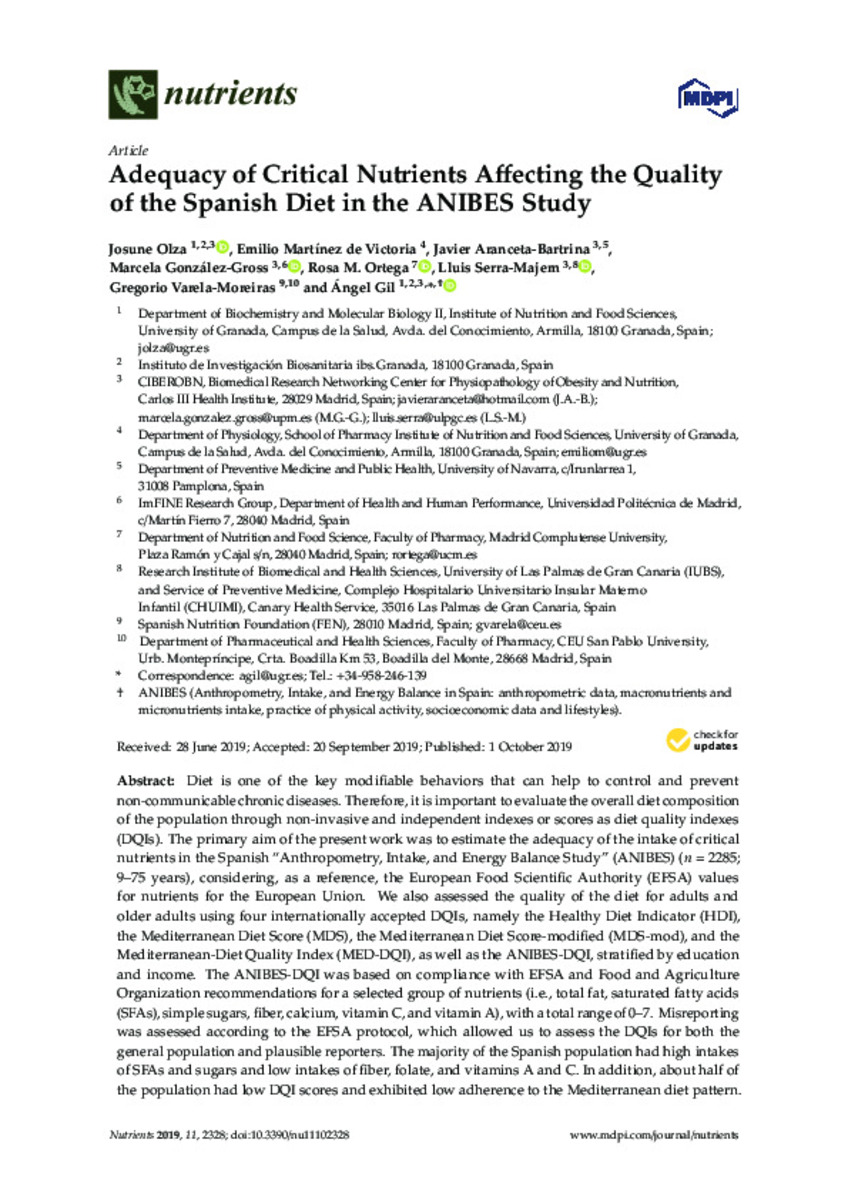Full metadata record
| DC Field | Value | Language |
|---|---|---|
| dc.creator | Olza, J. (Josune) | - |
| dc.creator | Martínez-de-Victoria, E. (Emilio) | - |
| dc.creator | Aranceta-Bartrina, J. (Javier) | - |
| dc.creator | González-Gross, M. (Marcela) | - |
| dc.creator | Ortega, R.M. (Rosa María) | - |
| dc.creator | Serra-Majem, L. (Luis) | - |
| dc.creator | Varela-Moreiras, G. (Gregorio) | - |
| dc.creator | Gil, A. (Ángel) | - |
| dc.date.accessioned | 2021-09-23T09:54:23Z | - |
| dc.date.available | 2021-09-23T09:54:23Z | - |
| dc.date.issued | 2019 | - |
| dc.identifier.citation | Olza, J. (Josune); Martínez-de-Victoria, E. (Emilio); Aranceta-Bartrina, J. (Javier); et al. "Adequacy of Critical Nutrients Affecting the Quality of the Spanish Diet in the ANIBES Study". Nutrients. 11 (2328), 2019, 1 - 17 | es |
| dc.identifier.issn | 2072-6643 | - |
| dc.identifier.other | PMID: 31581518 | - |
| dc.identifier.uri | https://hdl.handle.net/10171/62059 | - |
| dc.description.abstract | Diet is one of the key modifiable behaviors that can help to control and prevent non-communicable chronic diseases. Therefore, it is important to evaluate the overall diet composition of the population through non-invasive and independent indexes or scores as diet quality indexes (DQIs). The primary aim of the present work was to estimate the adequacy of the intake of critical nutrients in the Spanish "Anthropometry, Intake, and Energy Balance Study" (ANIBES) (n = 2285; 9-75 years), considering, as a reference, the European Food Scientific Authority (EFSA) values for nutrients for the European Union. We also assessed the quality of the diet for adults and older adults using four internationally accepted DQIs, namely the Healthy Diet Indicator (HDI), the Mediterranean Diet Score (MDS), the Mediterranean Diet Score-modified (MDS-mod), and the Mediterranean-Diet Quality Index (MED-DQI), as well as the ANIBES-DQI, stratified by education and income. The ANIBES-DQI was based on compliance with EFSA and Food and Agriculture Organization recommendations for a selected group of nutrients (i.e., total fat, saturated fatty acids (SFAs), simple sugars, fiber, calcium, vitamin C, and vitamin A), with a total range of 0-7. Misreporting was assessed according to the EFSA protocol, which allowed us to assess the DQIs for both the general population and plausible reporters. The majority of the Spanish population had high intakes of SFAs and sugars and low intakes of fiber, folate, and vitamins A and C. In addition, about half of the population had low DQI scores and exhibited low adherence to the Mediterranean diet pattern. Overall, older adults (>65-75 years) showed better DQIs than adults (18-64 years), without major differences between men and women. Moreover, primary education and low income were associated with low MDS and ANIBES-DQI scores. For the ANIBES-DQI, the percentage of the population with low scores was higher in the whole population (69.5%) compared with the plausible energy reporters (49.0%), whereas for medium and high scores the percentages were higher in plausible reporters (41.2% vs. 26.2% and 9.8% vs. 4.3%, respectively). In conclusion, the present study adds support to marked changes in the Mediterranean pattern in Spain, and low education and income levels seem to be associated with a low-quality diet. Additionally, the misreported evaluation in the ANIBES population suggests that this analysis should be routinely included in nutrition surveys to give more precise and accurate data related to nutrient intake and diet quality. | es_ES |
| dc.description.sponsorship | This research received no external funding, exceptin those derived of a grant from Coca-Cola Iberia through an agreement with the Spanish Nutrition Foundation (FEN). | es_ES |
| dc.language.iso | eng | es_ES |
| dc.publisher | MDPI AG | es_ES |
| dc.rights | info:eu-repo/semantics/openAccess | es_ES |
| dc.subject | Materias Investigacion::Ciencias de la Salud::Nutrición y dietética | es_ES |
| dc.subject | Adequacy of intake | es_ES |
| dc.subject | Diet quality | es_ES |
| dc.subject | Diet quality indexes | es_ES |
| dc.subject | Dietary recommended intakes | es_ES |
| dc.subject | Nutrients | es_ES |
| dc.title | Adequacy of Critical Nutrients Affecting the Quality of the Spanish Diet in the ANIBES Study | es_ES |
| dc.type | info:eu-repo/semantics/article | es_ES |
| dc.description.note | This article is an open access article distributed under the terms and conditions of the Creative Commons Attribution (CC BY) license (http://creativecommons.org/licenses/by/4.0/). | es_ES |
| dc.identifier.doi | 10.3390/nu11102328 | - |
| dadun.citation.endingPage | 17 | es_ES |
| dadun.citation.number | 2328 | es_ES |
| dadun.citation.publicationName | Nutrients | es_ES |
| dadun.citation.startingPage | 1 | es_ES |
| dadun.citation.volume | 11 | es_ES |
Files in This Item:
Statistics and impact
Items in Dadun are protected by copyright, with all rights reserved, unless otherwise indicated.






